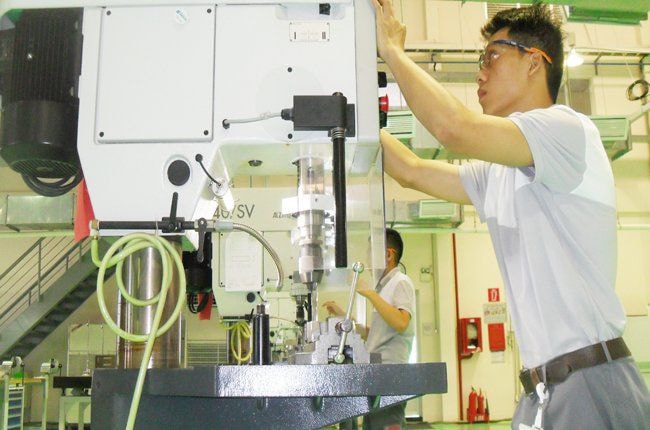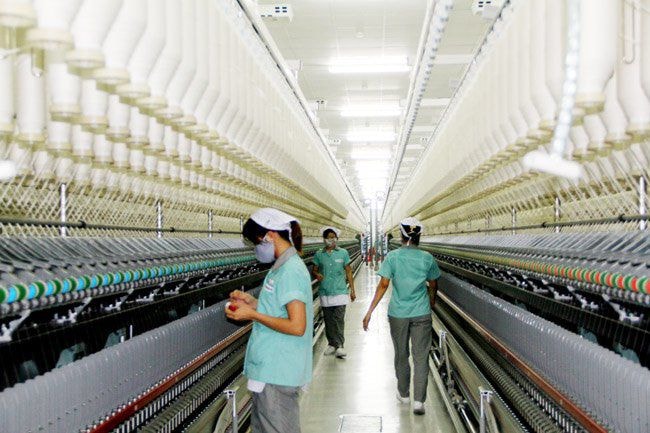Will there be a big wave of foreign investment in Vietnam after TPP?
The successful conclusion of negotiations by 12 countries participating in the Trans-Pacific Partnership (TPP) Agreement has created an atmosphere of excitement and optimism in Vietnam. Foreign investment flows into Vietnam, both direct and indirect, are expected to increase, but experts also warn that the challenges ahead are huge due to the weak internal strength of the economy.
 |
| Produced in a foreign enterprise |
According to analysts, joining the TPP will open up opportunities for Vietnam to attract foreign investment in general, including foreign direct investment (FDI), foreign indirect investment (FII) and other foreign investment sources.
FDI capital will increase
Mr. Phan Huu Thang, former Director of the Foreign Investment Department (Ministry of Planning and Investment), said that TPP is a model free trade agreement (FTA) of the 21st century, with a deeper and broader level than the WTO in the areas of tax cuts; increasing the openness of services; strengthening regulations related to foreign investment and investor protection; protecting intellectual property rights; increasing transparency in competition; labor issues...
Therefore, trade relations between Vietnam and TPP member countries will develop strongly in the future, thereby attracting investment capital into Vietnam from TPP countries and countries outside the bloc. Investors outside the TPP will invest in Vietnam to benefit from tariff incentives.
According to Mr. Thang, within the bloc, investment from two partners, Japan and the US, is expected to increase sharply because these two countries have many advantages in technology and engineering that Vietnam wants to attract. Regarding the Japanese partner, Mr. Thang said that investment from this country has been constantly increasing in Vietnam in recent times, notably in the new investment sector, which is Vietnam's weak agricultural sector.
Recently, many large American corporations also expressed that if the TPP is signed, the US will be the leading investor in Vietnam.
 |
| FDI capital into textiles and garments has increased sharply in the past two years as foreign textile and garment enterprises anticipate Vietnam's accession to the TPP to benefit. |
Industrial infrastructure development companies also believe that once the TPP is signed, Vietnam will have a superior competitive advantage in attracting foreign investment, because countries competing with Vietnam such as China, the Philippines, Indonesia, Thailand, Myanmar... have not yet joined the TPP.
Some companies such as Becamex IDC, Vietnam - Singapore Industrial Park and Urban Infrastructure Development Company (VSIP), Amata Group (Thailand)... have recently also increased the development of new industrial and urban infrastructure projects in some provinces and cities to seize opportunities.
Speaking to the press recently, Mr. Nguyen Van Hung, Chairman of the Board of Members of Becamex IDC, assessed that in the context of Vietnam integrating more deeply with the world economy, especially with the TPP, the possibility of foreign investment capital into Vietnam will increase in the coming time.
According to Mr. Hung, the groundbreaking of the Becamex - Binh Phuoc industrial and urban complex with a scale of more than 4,633 hectares in Binh Phuoc province in mid-September by Becamex also aims to anticipate the increasing waves of foreign investment in Vietnam.
The TPP Impact Report recently published by the Vietnam Institute for Economic and Policy Research (VEPR) assessed that when participating in the TPP, foreign investment is expected to increase by about 13 billion USD, an increase nearly equal to the increase in FDI attraction to Japan, double the increase in FDI to Australia, Malaysia...
According to VEPR's report, the reason for the increase in FDI is because Vietnam is a country with export advantages such as cheap labor, lower average input costs compared to many other countries, and raw materials for many industries such as agricultural products and seafood are available locally.
In fact, since 2013, before the TPP became a reality, many projects on textiles, footwear, etc. from countries outside the TPP bloc have poured into Vietnam, and this is a specific example of the ability to attract FDI from countries outside the TPP bloc.
And increase indirect capital
Not only direct investment, according to analysts, participation in the TPP also has an impact on indirect investment (FII) capital through mergers and acquisitions (M&A).
According to Mr. Phan Huu Thang, the M&A wave in Vietnam is increasing, foreign investors entering the Vietnamese market through the acquisition of domestic enterprises has increased significantly. Vietnam's participation in the TPP will further promote the M&A wave in Vietnam in the coming period.
According to businesses, the Government's recent policies through the Investment Law, Enterprise Law, Real Estate Business Law 2014, which have been effective since the beginning of July, loosening the "room" in the stock market... will promote foreign capital flow into Vietnam.
With the capital market, investment funds and financial corporations already present in Vietnam are increasing their investment expansion and other new corporations and investment funds are also coming. In order to attract this capital flow to securities companies, promoting the equitization of state-owned enterprises is the right direction in attracting foreign capital.
However, according to an expert, attracting foreign capital through the stock market alone can grow strongly, but it is too early to say that there will be a "big wave" in this market, although the completion of TPP negotiations has had an immediate positive effect on the domestic stock market, with the VN-Index increasing by nearly 2% yesterday, October 6, to surpass the 575-point barrier to 581.29 points.
Sharing with TBKTSG Online, the leader of a large securities company said that TPP will help the stock market attract new cash flows and that is what the securities industry is expecting. However, according to him, that is the general feeling in the long term, but there will not be a story of indirect capital pouring into the Vietnamese stock market like the "tsunami" in 2007.
Why? Because we need to look back at the real strength of the Vietnamese economy. The stock market is a simulation of the real health of the economy. The internal strength of Vietnamese enterprises has been strongly differentiated in recent times. Weak enterprises have left the market while the remaining enterprises have made efforts to become stronger.
However, with initial information about TPP, it can be seen that Vietnam's strong industries such as textiles, agriculture, technology, and industrial parks will be more optimistic while industries such as milk, steel, pharmaceuticals, construction materials, and mechanical automobiles may face more challenges.
The above leader also said that it is too early to say that TPP will create a big wave for the stock market; therefore, we should learn more, observe, act, read carefully the specific provisions, and implement those provisions "into" the real model to know the specific impacts, but we cannot evaluate immediately. "Although the general feeling is that the Vietnamese economy will benefit, including the stock market, the more important thing is action, how to swim in the face of the big wave," he said.
Besides, the scale of Vietnam's stock market is currently over 30% of GDP, much lower than many countries in the region, and this ratio needs to be improved strongly in the coming time so that the market can be large enough to "absorb" large capital flows if any due to the impact of TPP.
By the end of the first half of this year, according to the State Securities Commission, the portfolio of foreign investors in the Vietnamese stock market was estimated at more than 14 billion USD. This proves that foreign investors still have confidence in the Vietnamese stock market. In fact, the management agency always wants foreign investors to be an important factor promoting the development of the stock market, but Vietnam has not yet become a destination to attract foreign indirect investment capital. The current legal corridor has not significantly expanded the investment space, reduced administrative procedures, and created conditions for foreign investors to easily participate in the Vietnamese stock market.
More than just pink
According to VEPR research, integration always brings both opportunities and challenges to participating countries.
TPP, on the one hand, brings FDI capital into Vietnam and helps the supporting industry develop, but it also becomes the biggest competitor, making it difficult for domestic companies without large scale and modern technology to survive. This can be seen more clearly if we look at recent developments.
TPP is a trade agreement, and in that common market, many countries have excess capacity, making it more difficult for factories in Vietnam... "That is a real health check, if you are not healthy, it will be difficult to survive," commented the leader of the above securities company.
Looking back at history, the North American Free Trade Agreement (NAFTA) is an agreement quite similar to the TPP between the three countries of Canada, the US and Mexico signed in 1994. But after joining NAFTA, in 1995 and 1996, Mexico suffered a financial crisis due to poor handling of the trade deficit, and this is a lesson that Vietnam should take note of.
The integration process will have a profound impact on all sectors of the entire economy. The sectors that will be greatly affected when Vietnam joins the TPP will be livestock farming, distribution and retail businesses, and the small and medium-sized enterprise sector, according to experts.
Mr. Phan Huu Thang said that the opportunity to attract FDI from TPP member countries and non-TPP countries will be huge, but the challenge is that there will be many projects with low technical and technological content, easily causing environmental pollution in different fields such as textile dyeing, garment, leather and footwear, etc. from countries where Vietnam is having a trade deficit, so it is necessary to know how to eliminate the above projects.
Obviously, integration brings many benefits as well as challenges. Experts say that localities need to take advantage of this opportunity to exercise the “right to choose” projects to improve the quality and efficiency of attracting this capital flow.
Therefore, according to analysts, to take advantage of opportunities from the TPP, Vietnam must continue to improve the investment environment, enhance the competitiveness of the investment environment, and enhance the responsibility of state officials in performing public duties related to investment and business.
According to TBKTSG
| RELATED NEWS |
|---|






